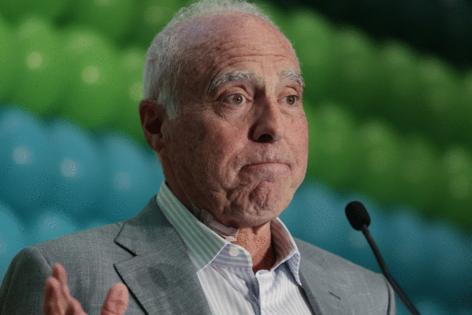Mike Sielski: The Eagles want a new stadium. If feedback is any indication, Philly doesn't.
Published in Football
PHILADELPHIA — It’s not often that a column, especially one about a relatively controversial topic, generates a reader response that is unanimous in its agreement with the piece’s central argument. There’s usually a loud dissenter somewhere, even if a particular assertion would seem obvious and indisputable.
I could write, "Let me be clear: Kyle Schwarber is good at hitting home runs," and someone somewhere would fire off an email or a Twitter/X post saying, “DUDE WRONG BRYCE IS BETTER!” This is the territory a professional opinion-giver occupies, and these are the features and facets that come with it.
But the reaction to one recent column has broken from that norm. I suggested last week that if Jeffrey Lurie and the Eagles want a new, domed stadium, they should cover the cost of it with as little public funding as possible, if any: “The evidence that municipalities derive much economic benefit from building stadiums and arenas is scant at best and nonexistent at worst.”
In the days since, I’ve received dozens of responses to the piece, and not one, not a single one, supported the Eagles’ building a stadium to replace Lincoln Financial Field.
Now, I’m under no illusions that the people who happened to read the column and felt compelled to contact me about it are necessarily representative of how everyone in the Delaware Valley feels about the idea of ditching the Linc and breaking ground on something bigger, more comfortable, and more expensive. There surely are plenty of people who wouldn’t mind if the Eagles played their home games indoors, if Philadelphia hosted a Super Bowl, or if the city joined the regular rotation of sites for the men’s Final Four and other national and international sporting events.
Still, it was telling that, assuming those perspectives are out there, no one expressed them, at least no one who was willing to use his or her real name. (Sorry, the anonymous commenters on this website or social media don’t count.) A sampling of the responses will be enough to provide a flavor of their overall tone and content.
Jim Gaffney wrote that “with hospitals closing, SEPTA broke, and schools struggling,” the timing of the Eagles’ floating the idea of a publicly funded stadium, let alone pursuing that idea, wasn’t great. Dennis S., in a fit of sarcasm, wrote that a more state-of-the-art stadium would be a “good idea, since the one we already built is beautiful and seems brand new.”
Ernie, who has been a season-ticket holder for the last 22 years, acknowledged that the Eagles had sent him a questionnaire about options for a new stadium or upgrades to the Linc.
“The proposed price ranges for seat licenses and tickets and ‘experiences’ were downright scary,” he wrote. “Clearly, the working-class Eagles fans are going to be priced out of seeing games in a new — or maybe even renovated — stadium. As a 71-year-old, I’m nearing the end of my ‘in-person’ experience, but I’m concerned that passing my seat license and seats onto my kids might create serious financial decisions for them that might deprive them of the same experiences we have shared.”
Terry Masterson, who worked for 39 years as an economic development director in Massachusetts and New York, wondered why any public money poured into a new stadium wouldn’t be better spent somewhere else.
“The best example of how little ballparks offer in economic benefits is Yankee Stadium,” he wrote. “They will host well over two million attendees, but there are no tangible economic assets outside of the stadium.”
He cited the construction and unveiling of Baltimore’s Camden Yards in the early 1990s as another example.
“Many people think that Camden Yards created the Inner Harbor,” Masterson wrote, “but the Inner Harbor was booming long before the Orioles left Memorial Stadium. And now the Inner Harbor has collapsed.”
If there are readers and Philadelphia-area residents who would love to see a new stadium in South Philadelphia and wouldn’t mind handing over some of their tax dollars to fund it, it would be terrific to hear from them. This issue isn’t going away — not with the 76ers and Flyers on their way to building an arena that they will share, not with the Battery Atlanta giving billionaires a model for mixed-use development, not with the unending arms race in professional sports over facilities and locations and the degree to which municipal wage taxes can cut into an athlete’s earning power.
For their part, Lurie and the Eagles should understand what the public sentiment on a new, publicly funded football stadium actually is. If this small sample is any indication, that position is pretty clear: Philly doesn’t want this.
©2025 The Philadelphia Inquirer. Visit inquirer.com. Distributed by Tribune Content Agency, LLC.







Comments